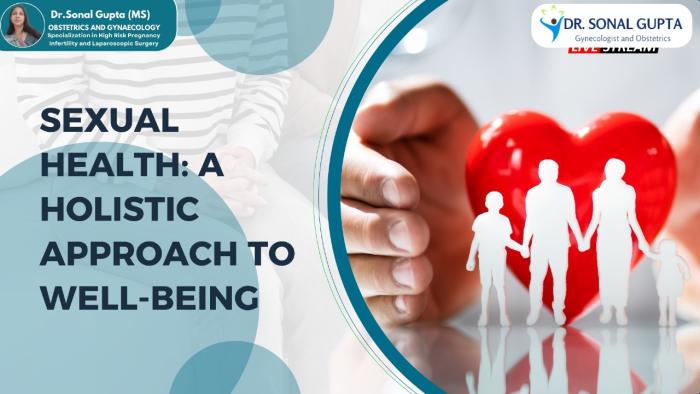- For Appointment: +91 9568139362
- Mon-Sat (10am - 8pm)
- drsonalgupta2@gmail.com
- Login

Jan 17, 2025 Dr Sonal Gupta
Sexual Health: A Holistic Approach to Well-being
Explore the importance of sexual health as part of overall well-being, with expert insights into physical, emotional, and relational aspects.
Sexual health is an essential component of overall health and well-being, encompassing physical, emotional, mental, and social aspects. It’s about more than just the absence of disease or dysfunction—it’s about a positive, respectful approach to sexuality and relationships. In this blog, we take a holistic look at sexual health and how to nurture it.
What is Sexual Health?
The World Health Organization (WHO) defines sexual health as "a state of physical, emotional, mental, and social well-being in relation to sexuality." It involves the ability to:
-
Make informed decisions about your sexual and reproductive health.
-
Maintain healthy, respectful relationships.
-
Enjoy a safe and satisfying sex life free from coercion, discrimination, or violence.
Physical Aspects of Sexual Health
-
Regular Checkups:
-
Schedule routine visits to a gynecologist or healthcare provider to screen for sexually transmitted infections (STIs) and other health concerns.
-
Discuss contraception options to make informed choices that suit your needs.
-
-
Hygiene and Protection:
-
Practice good genital hygiene to prevent infections.
-
Use protection, such as condoms, to reduce the risk of STIs and unplanned pregnancies.
-
-
Understanding Your Body:
-
Learn about your anatomy and how your body functions.
-
Recognize normal versus abnormal changes and consult a healthcare provider when needed.
-
Emotional and Mental Well-being
Sexual health is deeply connected to emotional and mental health. Here’s how to nurture both:
-
Communicate Openly:
-
Talk to your partner about your needs, boundaries, and concerns.
-
Seek professional guidance if communication becomes challenging.
-
-
Address Emotional Barriers:
-
Stress, anxiety, or past trauma can impact sexual health. Counseling or therapy can help address these issues.
-
Build self-esteem and a positive body image to enhance your overall confidence.
-
-
Educate Yourself:
-
Access reliable resources to learn about sexual health, consent, and relationship dynamics.
-
Stay informed about topics like STIs, contraception, and healthy relationships.
-
Social and Relational Well-being
-
Healthy Relationships:
-
Mutual respect, trust, and open communication are the foundations of a healthy relationship.
-
Recognize signs of unhealthy or abusive relationships and seek support when necessary.
-
-
Consent and Boundaries:
-
Always practice and respect consent in all aspects of intimacy.
-
Establish and communicate your personal boundaries clearly.
-
-
Support Networks:
-
Surround yourself with friends and family who encourage healthy decisions.
-
Join community groups or attend workshops to broaden your understanding of sexual health.
-
Breaking Myths About Sexual Health
-
Myth: Sexual health is only about STIs and contraception.
Fact: It includes emotional, mental, and relational aspects as well. -
Myth: Only young people need to worry about sexual health.
Fact: Sexual health is important at every age and stage of life. -
Myth: Talking about sexual health is taboo.
Fact: Open discussions lead to better understanding and healthier choices.
Conclusion
Sexual health is a vital aspect of overall well-being that deserves attention and care. By adopting a holistic approach—focusing on physical, emotional, and relational aspects—you can lead a healthier, more fulfilling life. For expert advice and personalized care, consult Dr. Sonal Gupta at Ojas Hospital. Visit https://drsonalgupta.in/index.php to book your appointment today.
